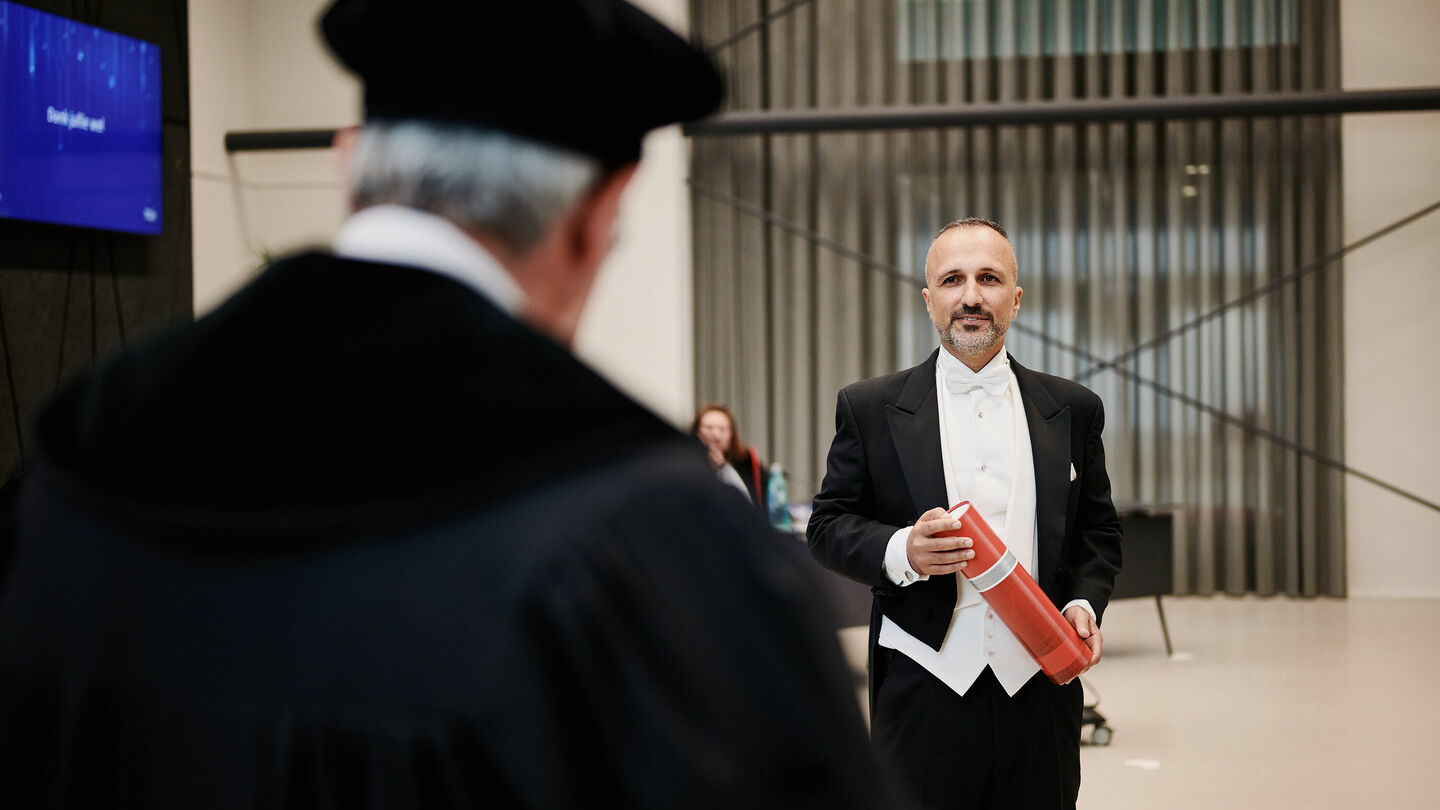
Lawyers with a touch of science
PhD research on privacy protection and big tech marks end of Chair of Law and Technology
In an era of rapid digitization, regulations and laws are essential in meeting technological and societal challenges, argue emeritus professor Jan Smits and his PhD candidate Renas Hamad. With Hamad successfully defending his dissertation at the Department of IE&IS last week, the Chair of Law and Technology has definitively closed its doors at TU/e.
Admittedly, they always felt a bit like ‘the odd ones out’ as humanities scholars among the ‘techies’, Hamad says with a smile. As an external PhD candidate – alongside his job as a corporate lawyer at PXS – he spent quite some time at TU/e. “I learned to formulate things more concretely.” He acknowledges that the practical side of things wasn’t always ideal. For example, there are hardly any legal papers available in the TU/e library. Hamad therefore often visited his alma mater and put in regular appearances at the Nijmegen law faculty.
His supervisor, emeritus professor Jan Smits, gave his valedictory lecture in 2018, but has never been far from TU/e. Smits: “Startups often encounter all kinds of legal issues. Should we be a private limited company or a general partnership, how do we divide the shares? I help them, as a kind of legal guide.”
Social responsibility
Smits emphasizes that lawyers are also very important at a technical university. “Take the energy transition, or AI technology, for example. If you want to draw up legal provisions relating to technology, you need specialized legal knowledge. We have long been the link between technology and regulations.”
With the loss of his chair, this knowledge will also disappear, Smits says with a sigh. “A lot of new technology is being developed. But unfortunately, lawyers are dying out in the academic domain at TU/e. Fundamental research is important, but an academic institution also has a major social responsibility.” Hamad wholeheartedly agrees. “Innovation is steered in the right direction by means of laws; the two go hand in hand. We have to compete with other countries, but we mustn’t lose sight of our civil rights.”
Although Law and Technology has always been a relatively small group, it has successfully made a name for itself in a number of areas, such as the standardization of technical standards. “TU/e professor of Standardisation and Intellectual Property Rudi Bekkers, world-renowned in the field of patents, also started out with us.”
Smits is most proud of the major role they played in the new wording of Article 13 of the Constitution of the Netherlands, concerning the privacy of correspondence and telecommunications. “Much of our confidential report for the Ministry of the Interior has found its way into the constitution.”
Don’t click without thinking
What’s special about Hamad’s PhD research is that he has examined the protection of personal privacy in detail, says Smits. Not only the aforementioned Article 13, but ‘the entire privacy package’: from Article 10 on general privacy and Article 11 on physical integrity to Article 12 on the right to inviolability of the home.
Now that society is rapidly digitizing – most people own one or more smart devices and constantly leave a trail of data behind – Hamad recommends combining and modernizing these four constitutional principles in order to continue protecting citizens.
“The influence of Big Tech is enormous. A single like on Facebook can reveal a lot: ethnicity, religion, political preferences. And within 0.01 seconds, most online visitors agree to the privacy terms and conditions. Of course, it’s almost impossible to read through the entire document, but don’t just click agree without thinking. Be critical. And remember that there are alternatives. You don’t have to store all your data in the cloud, and you don’t have to install cameras throughout your home.”
Comic book
With his research, Hamad isn’t only championing his own privacy and ours, but also – and especially – that of the next generation, which is growing up in a largely digitized society. That’s why he invited a relatively large number of children – including his own, of course – to his PhD defense. “They don’t realize it yet, but these are very important issues for them.”
To engage them in these ‘grown-up issues’, Hamad peppered his dissertation with relevant Fokke & Sukke cartoons, some of which were even specially adapted by the cartoonists – “they’re very concerned about privacy.” Hamad considers this a great honor. Then, laughing, he adds: “That idea didn’t quite work out as planned. My children now proudly tell everyone that their dad has written a comic book.”


Discussion